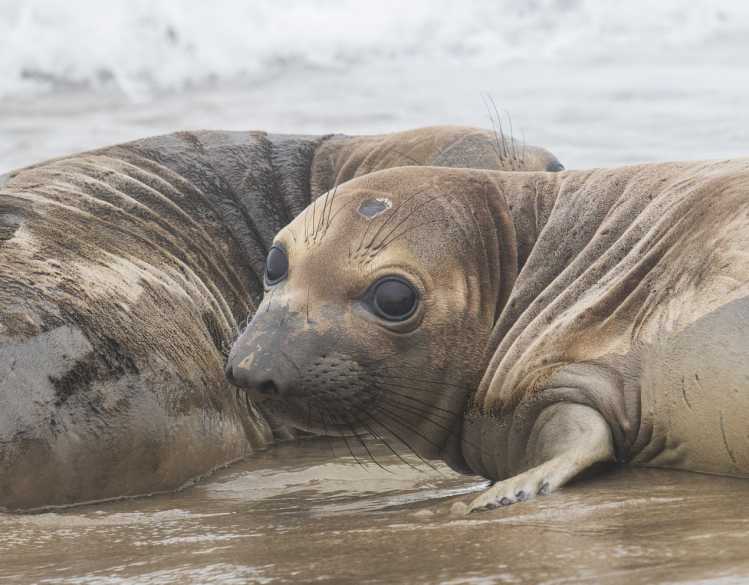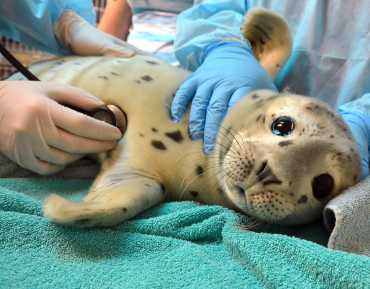
Achievements in Ocean Health
- Domoic acid
- Species conservation
- Population monitoring
The Marine Mammal Center is celebrating 50 years of advancing ocean health. As we look back on our impact across five decades and our most recent achievements over the past year, there’s a lot to be proud of—and you can feel proud of the role you’ve played in making this vital work possible.
Dive into a few of our many accomplishments together in 2024 and see how caring people like you are continuing to make a difference for marine mammals.

Advanced ocean health through marine mammal rescue and rehabilitation, research, and education.
2024 was an impactful year at the Center—we rescued 941 marine mammals, inspired 5,800 students and teachers, published 12 research papers that expand global knowledge about marine mammal and ocean health, and so much more!
Achieved a milestone celebrating the 10th anniversary of Ke Kai Ola, our Hawaiian monk seal hospital and conservation program.
As we celebrate the growth of our Hawaiian monk seal conservation work, we are also celebrating the growth of this population. The endangered Hawaiian monk seal population has passed 1,600 individuals, and nearly 30 percent of these animals are alive directly due to conservation efforts led by NOAA and partners like the Center.
Today, we are a lead responder to Hawaiian monk seals on Hawai‘i Island while providing outreach to beachgoers as well as inspiring students through our education programs. As we educate the public, conduct research and treat patients, some of which have pups of their own, we are ensuring the continued growth of this endangered species.


Advanced research on cetaceans, or whales, dolphins and porpoises, by monitoring animals in the San Francisco Bay region, analyzing sighting data and performing necropsies.
As cetacean paths increasingly overlap with high-traffic shipping routes, ship strikes have become a leading cause of death for large whales on the California coast, and particularly those entering San Francisco Bay. The Center’s research on whales and their movements in this area, which can be unfamiliar to ships and recreational boaters unless notified, is crucial to preventing deadly collisions with whales.
Thanks to support from caring people like you, our experts are working closely with the San Francisco Harbor Safety Committee alongside groups that include the United States Coast Guard and ferry operators to protect whales. From cutting engines and allowing whales to pass safely to temporary lane changes in areas with heavy whale presence, action is being taken right now.
Expanded our impact by moving our Monterey Bay Operations to a new facility in Castroville, California.
Our organization helps marine mammals that are facing increasing threats to their ocean home, like pollution and climate change. To meet this need, we are continuously adapting our operations.
Our new Castroville location will provide a sustainable base of operations in the Monterey area, which is in the middle of our 600-mile response range in California. Not only will our new facility help us provide even better care for seals, sea lions and sea otters in need, but it will also support our response efforts to whale entanglements.


Responded to more than 150 sick sea lions affected by an outbreak of domoic acid, a potentially deadly neurotoxin, in 2024.
In marine mammals, domoic acid attacks the brain and heart causing seizures and heart failure. At our hospital, rescued animals are provided with treatments like anti-seizure medications and fluids to flush the toxin from their bodies.
Our veterinary experts are not only leaders in treating and expanding research on this disease, but also in monitoring emerging diseases to protect marine mammal and human health. We continue to be prepared to rescue and treat marine mammals that suffer from domoic acid poisoning across our range, and Center researchers are investigating new therapies to improve outcomes for affected patients.
Empowered people within the community and from around the world to take action for a healthy ocean.
From visitors at our hospital to students and teachers in our education programs, thousands of youth and adults each year are inspired by our experts about the connection between marine mammals and ocean health.
In 2024, 28 teens who participated in Youth Crew, our annual service-learning program for high school students, learned strategies for talking about climate change and engaged more than 7,400 visitors over the summer. Inspired by conversations with these young leaders, visitors and volunteers took many positive climate actions, like utilizing public transportation, collectively preventing 18 tons of carbon dioxide from being released into the Earth’s atmosphere.
The Center has also expanded our impact as the sponsor for the National Network for Ocean and Climate Change Interpretation (NNOCCI), one of the world’s largest climate change communication training programs that has reached hundreds of millions of people. Thanks to our work with NNOCCI, we were selected as a 2025 American Climate Leadership Award semifinalist.

As we reflect on the profound impact the Center has made in the past with the help of caring people like you, we know this crucial work must continue. The health of the ocean, marine mammals and humans are interconnected. In the face of climate change and other ocean health threats, our collective future depends on what we do next.
Together we can make the next 50 years even more impactful. Join us in commemorating our anniversary milestone and driving lasting change for marine mammals, humans and our ocean.
Sign up for email today to get critical updates on marine mammals delivered straight to your inbox. And make a gift to help return marine mammals to a healthier ocean home.
Yes, I want to save a life!

Yes, I want to save a life!
You’ll be giving sick and injured animals the best possible care at the Center’s state-of-the-art hospital. With your gift today, you are giving a patient a second chance at life in the wild.
See Our Latest News
{"image":"\/Animals\/Wild\/Gray whale\/cropped-images\/two-gray-whales-golden-gate-bridge-shutterstock-0-0-1270-992-1770234810.jpg","alt":"two gray whales under the Golden Gate Bridge","title":"The Marine Mammal Center and San Francisco Harbor Safety Committee Pilot New Vessel Operator Training Program","link_url":"https:\/\/www.marinemammalcenter.org\/news\/the-marine-mammal-center-and-san-francisco-harbor-safety-committee-pilot-new-vessel-operator-training-program","label":"Press Release","date":"2026-02-06 01:00:00"}

The Marine Mammal Center and San Francisco Harbor Safety Committee Pilot New Vessel Operator Training Program
February 6, 2026
Read More{"image":"\/Animals\/Wild\/Bottlenose dolphin\/cropped-images\/dolphinphoto-by-adam-li-c-noaa-0-0-1270-992-1769539954.jpg","alt":"A bottlenose dolphin jumps out of the water.","title":"What\u2019s the Difference Between Dolphins and Porpoises? And Other Animal Trivia","link_url":"https:\/\/www.marinemammalcenter.org\/news\/whats-the-difference-between-dolphins-and-porpoises-and-other-animal-trivia","label":"News Update","date":"2026-01-26 23:00:00"}

What’s the Difference Between Dolphins and Porpoises? And Other Animal Trivia
January 26, 2026
Read More{"image":"\/Animals\/Patients\/Sea otters\/2025\/cropped-images\/so-mooring-release-2-laurie-miller-c-the-marine-mammal-center-USFWS-permit-MA101713-1-147-8-1270-992-1770307740.jpg","alt":"Sea otter - Mooring","title":"Rescue Stories: Southern Sea Otter Mooring Named the 2025 Patient of the Year","link_url":"https:\/\/www.marinemammalcenter.org\/news\/rescue-stories-vote-for-your-favorite-marine-mammal-patient-of-2025","label":"News Update","date":"2026-01-16 10:05:08"}

Rescue Stories: Southern Sea Otter Mooring Named the 2025 Patient of the Year
January 16, 2026
Read More{"image":"\/People\/Action\/Veterinary care\/cropped-images\/Harris_Green turtle_TMMC-0-0-1270-992-1767649941.jpg","alt":"Heather Harris","title":"Seattle Aquarium Awards Dr. Heather Harris With Prestigious Conservation Research Award","link_url":"https:\/\/www.marinemammalcenter.org\/news\/seattle-aquarium-awards-dr-heather-harris-with-prestigious-conservation-research-award","label":"In the News","date":"2026-01-05 04:48:00"}

Seattle Aquarium Awards Dr. Heather Harris With Prestigious Conservation Research Award
January 5, 2026
Read More